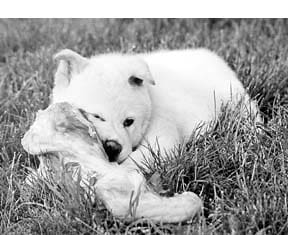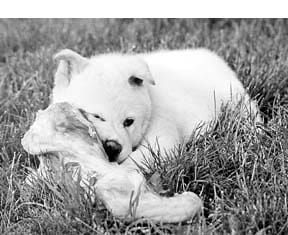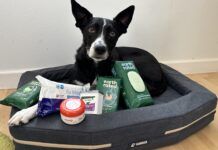Read any good puppy contracts lately? Probably not. Health and placement guarantees, spay and neuter requirements, limited registration and other legal details are important, but they can (yawn) put you right to sleep. Well, that used to be true, but today some breeders are writing contracts that leave people rubbing their eyes in disbelief because they contradict everything mainstream veterinary medicine recommends. These contracts require puppy buyers to feed an all-raw diet, avoid routine vaccinations, and use holistic therapies instead of conventional veterinary care.

Although she no longer has time to breed the Basset Hounds that remain her first love, Marina Zacharias of Jacksonville, Oregon, is well-positioned to observe this growing trend. A disciple of Juliette de Bairacli Levy, one of the earliest advocates for an all-natural diet for dogs and cats, Zacharias’ Natural Rearing philosophy has shaped the lives of dogs, cats, and other animals around the world for half a century. She publishes a bi-monthly newsletter as well as an annual directory of breeders who rely on nutrition and natural therapies to prevent and treat health problems in dogs and cats.
“Every responsible breeder wants the best for every puppy,” she says. “We all want our dogs to be healthy, intelligent, happy, and loved. A good breeder wants to know what kind of person you are, where you live, what kind of lifestyle you have, and what kind of match you would make with different puppies. What has changed in the minds of many breeders is the realization that commercial pet food, routine vaccinations, flea chemicals and symptom-suppressing drugs cause more problems than they solve.”
A Healthy Diet is the Most Common Requirement of Holistic Breeders
Zacharias saw the difference a natural diet makes when she bought her first Basset 13 years ago. “He had been raised on a premium-quality food for the first five and a half months of his life,” she says. “I switched him over to a raw-food diet, which he had a much easier time digesting, and he grew very well. When he was 18 months old, I saw some of his littermates, and the contrast was amazing. He had been one of the smaller puppies in the litter, and now he was the largest. His coat, bone density, posture, eyes, disposition, and alertness were superior.
“It works the other way around, too,” she says. “I know breeders who raised their puppies on raw food and sent them to show homes where their diets were changed. When they saw the pups in show-handling class a few weeks later, their coat quality and bone density had deteriorated and they didn’t look as well as they used to. It’s not that a raw-food diet pushes growth, which would be unhealthy, but it meets the animal’s genetic potential by providing all the nutrients the body needs to grow properly.”
Breeders who feed a natural diet do more than strengthen individual dogs; they improve their entire lines. Barbara Werner, who raises Golden Retrievers in New Jersey, produced a second generation of raw-food puppies last spring. “This was my first litter from a dog who has been on raw food all her life, which is four years, and the difference was dramatic,” she says. “She showed none of the signs of nutritional stress that are common in pregnancy. Her coat stayed gorgeous, her labor was short, and she produced nine strong, lively pups that landed on their feet. This is a breed so prone to autoimmune disorders and cancer that one veterinarian told me a three-year-old Golden is now considered middle-aged. I find this attitude unacceptable. The puppies’ 11-year-old grandfather is still so vibrant, he wins show ribbons.”
Dog Ownership Contracts as Education Tools
Raw-food diets are intimidating to the uninitiated not because they are difficult to prepare but because they are unfamiliar. “Don’t forget that we have all been brainwashed to believe that dogs should eat processed dog food and that raw bones are bad,” says Christine Swingle, who raises West Highland White Terriers in Connecticut. “I have been feeding a raw-food diet for three years, and more recently, I gathered up the courage to feed raw chicken necks and wings. The Westies love them. Gee, it is amazing, but they do digest raw meaty bones despite what I was led to believe!”
To help her clients make the transition to raw foods, Swingle gives them books, articles and instructions weeks before the pups are ready to go. “I want my puppies’ guardians to appreciate the commitment they are making in sufficient time to get used to the idea of feeding raw bones and raw food,” she explains. “My health guarantee depends on feeding a ‘biologically appropriate raw food’ diet for life, the use of homeopathic nosodes, and the disuse of toxic chemicals such as found in flea and tick products.”
Kymythy Schultze, an animal health instructor, has raised Newfoundlands for 20 years and recently moved from Southern California to Washington State. “Natural health is today’s hot topic,” she says, “but I like to remind people that when we adopt a raw diet and use natural therapies, we’re not doing anything new. We’re doing something old-fashioned.
“When I made the transition 10 years ago, I met Newfie breeders who were still feeding their dogs the way everyone did before commercial pet foods were developed,” she continues. “These dogs ate the same raw meat, raw bones, and table scraps that people have been feeding their dogs for thousands of years, and they were strong and healthy, with calm dispositions, terrific coats, resistance to fleas, and a total absence of doggy odors.”
Kathy Herman realized the benefits of raw food when she visited Labrador Retriever breeders in England and met supremely healthy dogs – her first time seeing such healthy dogs, she later realized. On a diet of raw bones, raw meat, raw goat milk, vegetable peelings, other table scraps and cereal-based kibble, these minimally vaccinated dogs suffered from none of the problems common to American Labs. Herman adopted a similar regimen and gradually reduced the amount of kibble until her dogs were eating all raw food. Since she improved their diet 14 years ago, her dogs have been free of orthopedic problems, and the only puppies whose owners reported health problems were those who switched back to commercial food.
“My puppies go to people who are motivated and informed,” she says, “and I give them a three-day supply of raw food to help them get used to its preparation. I didn’t put raw foods into my contract until two years ago when the owners of an eight-month-old female called to say she was limping and the specialist recommended immediate surgery. When I asked if they were still feeding raw food, they said their veterinarian had frightened them into feeding one of the dog foods he sold at his clinic because raw meat is dangerous and raw chicken bones would make her sick.”
After Herman convinced the owners to forget about the surgery and resume her natural diet, the dog made a rapid recovery. “Most veterinarians know very little about nutrition,” she says, “and because they are authority figures, they can be intimidating. I suggest that when asked about their puppies’ food, my buyers simply say they’re feeding a home-prepared diet of meat, poultry, dairy products, vegetables, oatmeal and a few supplements. That sounds less frightening to most veterinarians than raw meat and raw bones.”
Like other holistic breeders, Herman encourages her clients to call her with questions and invites their veterinarians to do the same. “It’s difficult for most people to tell a conventionally trained veterinarian that they’re going to ignore his recommendations and continue feeding raw bones or that they won’t let him vaccinate their puppy,” she says, “but I have all the facts, figures, knowledge, and experience I need to discuss these requirements with anyone. I tell my clients not to debate these issues but to refer their veterinarians to me.”
It’s About Keeping the Puppy “Natural”
A contract requiring raw food and holistic health care typically states that the buyer agrees to feed the dog according to the breeder’s guidelines and that feeding commercial dog food in any form is unacceptable. If it mentions vaccinations, the contract may specify that no vaccines be used, that the buyer return the puppy to the breeder for minimal vaccinations or that the buyer locate a veterinarian who will follow the breeder’s vaccination schedule.

The contract’s language may be as gentle as the warning with which Jo Forsythe in Washington State concludes her Portuguese Water Dogs’ letter of sale (“Unless you follow my feeding and vaccination guidelines, I cannot guarantee the health of this puppy”) or it may stipulate financial penalties for feeding commercial food and giving conventional vaccinations. Fines are unusual, but some contracts reportedly include $5,000 or $10,000 penalties.
Are raw-diet, no-vaccination or limited-vaccination clauses in puppy contracts enforceable? Opinions vary, but Ohio German Shepherd breeder Joan Andreasen-Webb speaks for many when she says that isn’t what matters. “The best way to use a puppy contract is as a communication tool,” she explains. “The number-one priority for responsible breeders is finding good, stable, loving homes for our dogs. After we establish that someone is appropriate in that respect, we focus on education. Many puppy buyers have never had a dog, or they’re new to the breed or haven’t lived with a puppy before. A good breeder prepares new owners by showing and telling them what to expect.
“I know of breeders who have financial penalties in their contracts,” she continues, “and who require receipts documenting the purchase of ingredients for the raw-food diet, but this approach strikes me as unwieldy. In addition, a punitive attitude creates a relationship based on fear instead of trust. I would rather enforce my guarantee indirectly, by requiring puppy buyers to subscribe to Whole Dog Journal or the Natural Rearing Newsletter. That way they’ll get a ‘booster shot’ of important information every month, and they’re more likely to continue with natural methods and a raw diet. It’s confusing at first, which is why breeders have to provide patience, encouragement, and communication. There’s so much to learn when you’re starting out that an unfamiliar feeding plan on top of everything else can be overwhelming.”
Marina Zacharias agrees. “Many breeders who use an all-raw diet start by suggesting that the puppy get at least some fresh, raw food,” she says. “Soon these people see how much the puppy prefers it, how well she digests it and how healthy she is. Gradually they feed a little more fresh food until soon they’re off commercial food all together. The goal is to develop a good relationship with puppy buyers so they are continually learning and understanding why you want them to feed a natural diet and use holistic therapies. That’s much better than forcing it on them. A good long-term relationship between breeder and owner is always in the animal’s best interests.”
Some breeders put technology to good use as they collect information and share it with clients. Barbara Cicognani, a New York Akita breeder, produced her first raw-food litter in the spring of 1998. “My Internet website sets forth my philosophy with regard to the effect diet and vaccines have on health and structure,” she says, “and I make it plain that I expect my buyers to adhere to my guidelines when they buy a pup from me. My puppy contract includes a requirement that buyers continue feeding a raw diet and that they avoid vaccinations except for rabies, which is required by law. I encourage the use of natural therapies where appropriate, and I will not guarantee hips or other skeletal health unless the buyer adheres to a raw diet.”
Discussing diet, vaccinations and holistic therapies gives breeders an opportunity to evaluate prospective clients. “I am up front with people who come to be interviewed,” says Christine Swingle. “It keeps them informed and it gives me a chance to weed out individuals who are not willing to learn. Fortunately, many families are already health-conscious, and they grasp the logic right away.”
“Contracts are only as good as the people who sign them,” says Kymythy Schultze. “My pups’ quality of life is my responsibility, no matter where they live, forever. I would be undermining their future if I didn’t place them in homes that provide everything they need for optimum health and happiness. My puppy people want to live with a dog that won’t suffer from hip or elbow dysplasia, endocrine disorders, skin and coat problems, tooth and gum disease, fleas, parasites and a persistent doggy smell. By feeding a well-balanced raw diet, my puppy families and I work toward the same goal.”
Ownership Contracts for Naturally Reared Adult Dogs
Raw-food contracts are not unique to puppies. Breeders who insist that puppies receive a natural diet require the same for the adult dogs they place in new homes. Even some rescued dogs are covered by raw-food contracts.
Take, for instance, Darla Duffey of Jacksonville, Florida, who bred Shetland Sheepdogs for many years, and is active in Sheltie Rescue. “We try to place our rescued Shelties with people who have lost a dog to cancer, lupus, kidney disease or one of the other illnesses common in this breed,” she explains. “I tell them that if they don’t want the problem to happen again soon, they’ve got to keep the dog on a healthy diet. I go into the whys and wherefores, and in most cases, the light bulb goes on in their head as they make the connection. Most of the people who have adopted dogs or bought puppies from me in the past have had no problem with my contract or its feeding requirements.
“Here in Florida, we have a terrible flea problem,” she continues, “but as soon as they go on raw foods, our rescued Shelties stop itching, their skin heals, their coats improve and they’re less attractive to fleas. They look more alert, they’re less anxious, and their eyes are bright. This breed’s health has been going down the tubes for a long time and it’s going to take several generations to get it back on the right track. Fortunately, although it will take a long time to repair the breed, it doesn’t take long to improve the health of individual dogs.”
Thanks to holistic breeders, puppy contracts aren’t as dull as they used to be. In fact, the next one you read might be as exciting as a good book.
CJ Puotinen is the author of several books about medicinal herbs and The Encyclopedia of Natural Pet Care (1998 Keats Publishing). This is her second article for WDJ.







My thanks to fellow Natural Rearing Breeder, Josefina Giannoni Kwiecinski, for sending me this article! I too, learned so much from Juliette de Bairacli-Levy starting back in the ’70’s. I followed her protocols assiduously while raising my first dog, a collie and what a difference the raw diet made! Sadly, when I began raising Cotons in July of 2021, I succumbed to the hype and fear promoted by the “experts” and fed kibble for a few years. But that ended after years of digging deeper into the research and information on the questionable ingredients in kibble and explored the differences between taking the cheaper, easier kibble route and the more species appropriate RAW diet espoused by Juliette & the Natural Rearing community.